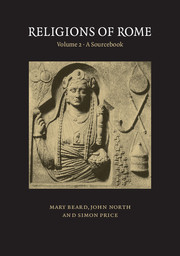Book contents
11 - Threats to the Roman order
Summary
Roman thinking about illicit versions of religious practices, which might threaten the religious and hence socio-political order, is the theme of this chapter. Laws defined illicit use of'drugs’ for poisoning and magic (11.2) and illicit forms of divination (11.7); a law regulated clubs and associations (11.9), and trials were held for foreign superstitio (11.10). In the republican period there were fears about foreign Pythagorean philosophy (11.1), and in the empire about the magi (11.3), the Jews (11.8), the Christians (11.11) and the Manichees (11.12). We also present here texts that reveal something of the actual practices that were so condemned: love magic (11.4), curse tablets (11.5) and magical revelation (11.6). Other chapters explore these practices further: divination (7.7), Judaism (12.6) and Christianity (12.7). But the conversion of Constantine in A.D. 312 changed the old rules: the Christian church now received imperial benefactions (11.13), and towards the end of the fourth century it was now traditional sacrifice that was banned as a superstitio (11.14).
See further: Vol. l,ch.5.
Burning of the Books of Numa (181 B.C.)
Apart from the action against the followers of Bacchus (12.1), there was little attempt under the Republic to destroy or repress un-Roman practices. But five years after the Bacchanalia affair there seems to have been further reaction against a foreign ‘threat', the philosophy of the Greek Pythagoras: Pythagorean treatises supposedly discovered in the tomb of King Numa (1.2) were burned on the order of a magistrate. There are problems with the story: Numa predated Pythagoras by 150 years, and the sources disagree about the number and content of the books; there is however no disagreement that some books were destroyed. It may be that the ‘discovery’ of the books was a deliberate attempt on the part of some members of the Roman elite to foist some new religious or philosophical doctrine on the Romans under the guise of attributing them to Numa.
See further: Delatte (1936); Gage (1955) 328-38; Pailler (1988) 623-703; Gruen (1990) 158-70*; other sources: Varro in Augustine, The City of God Vli.34; LivyXL.29; Plutarch, Life of Numa 222-5.
- Type
- Chapter
- Information
- Religions of Rome , pp. 260 - 287Publisher: Cambridge University PressPrint publication year: 1998



